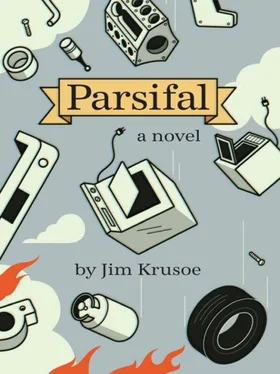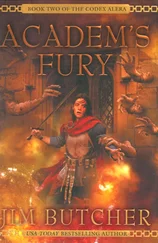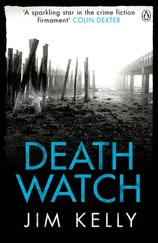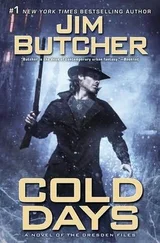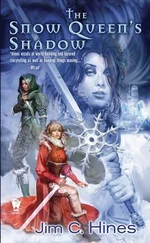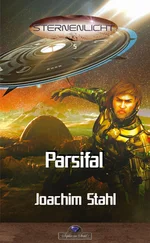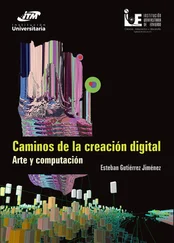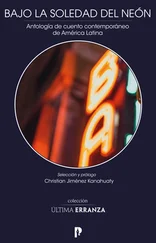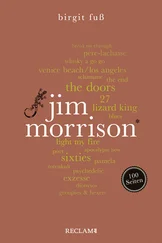The house had been spared by the fire. If Pearl had just stayed home, instead of insisting that she accompany him to the edge of the forest, she probably would have been fine, except for a little smoke inhalation.
All songs the one song.
Nor should it come as a surprise that in days of old the citizens of any society should have striven to expel all monsters, even if there was only a single one. The people looked at the monster and the monster looked back at them, swooping down from time to time to lay waste their towns and fields or to terrorize their virgins. But other than that, the monster always lived alone, in a cave or in a forest out of town, to be sought out as a test of some kind by only the bravest and most foolish of the town’s young men. And so the function of the monster was to give mankind a way, however false, to measure its so-called success.
So there Parsifal was, standing outside his own history, looking in at the house where his mother had lived and where he had been raised, and for a few moments he was unable to enter it. What kind of a monster was he to his own past? He looked in and recognized nothing. There were no chairs, no pots and pans, no table, no bed of leaves. It was obvious: it had been decades since he had seen it last, and during those years someone — maybe the same person who had carried away the door (he never really thought that it could have been eaten by an animal, even a porcupine) — had taken everything. He felt more alone than ever — far more alone than when he began the search. And how long ago was that? Parsifal couldn’t quite remember.
He had read in a book that in the Triassic Period over ninety-five percent of all life on this planet was made extinct.
Ninety-five percent of all life.
All books the same book.
All sight only a form of blindness.
Which is not to say Parsifal did not search. When he did finally get the nerve to half walk, half crawl into what had once been his home, he looked through everything — turned over every branch and log, swept up every leaf, and even used the shovel he’d found to dig where the floor used to be in hopes of finding something.
It took a while.
And when it came down to it, as tired as he was, and hungry and thirsty — his water was long gone — Parsifal would have settled for any personal item at all to prove that his trip had not been wasted, no matter how pathetic: it was not just Fenjewla that had been his reason for going, it could even be a button, or a bottle, a spoon— anything to prove that his past had been more than a dream. But there was nothing — no plate, no pot, no pan; the whole place had been picked absolutely bare, probably by one of those same human vultures who roam the beaches and parks (and, yes, sometimes the forests) with their metal detectors and their baseball caps and their headphones and their trowels in little holsters. But whoever it was, whether one or several people, the place had been completely stripped.
It meant that someone else had the cup.
Or Fenjewla was lost.
It was getting dark again. While Parsifal had pawed through the scraps of his old home, searching for the remains of what had once been his life, he had not felt the pain in his leg, but now that he noticed it again, it had reached his hip, and was two, three, four times worse than ever. Parsifal felt his forehead. It was wet with sweat, not so much from the heat — the air was beginning to cool — but from the exertion and the pain.
It seemed as good a place as any to spend the night.
Had the past been only a dream?
All rain the same rain.
A pen is . And so, was it very odd after all for a person to be fond of a sturdy pen that never grows limp in one’s hand, never runs out (if you have the kind of pen with an ink window so you can check it) of ink? Certainly, the analogy was nearly embarrassingly transparent, but did that make it less true? And at least it was not that old male/female hobby horse of the cumbersome and completely sterile baseball bat and the first baseman’s leather mitt smelling of sweat and neat’s-foot oil, or the stubby pigskin of professional football that finds itself tumbling end over end between the upright legs of two spindly goalposts, or the spermlike puck that travels across the ice at lightning speed to be caught inside the waiting net. Or even a hobby horse and rider. No, the notion of a pen as a fountain surely must speak volumes.
And so a pen is . And if pens are that (for who’s to say they aren’t?), at least their goal is not just to fill the white space of a single waiting piece of paper, or the larger, but still limited area of a human body’s skin, but a pen is available for projects both large and small, from dotting an i to the fourteen syllables of a haiku to a story, a novella, a novel, even a series of novels, a trilogy, with its ink never ceasing to flow (except to pause for refills from a waiting bottle, or several bottles), its nib never changing; just an occasional wipe of the tip and flush of its chamber and the pen is ready to continue its own blind and tireless process of production and reproduction: infinite, myriad, endless.
A pen is , and is it any wonder therefore that the rise of women’s literature was more or less paralleled by the extinction of the fountain pen, first seeing itself edged to one side by the hard rubber rollers and implacable keys of the typewriter, which was followed by the paperless e-mail wafting across cyberspace like an invisible mist of l’Air du Temps.
But Parsifal was not a writer. Until that moment it had been his job only to repair fountain pens, and, like those piano tuners who are able to unleash a burst of Lizst or Rachmaninoff to test the soundboard of a baby grand, and then fall into an embarrassed silence, in Parsifal’s profession all he was able to do was to execute a few well-flourished letters, just one sentence:
All things come to those who wait.
And he had waited. Parsifal had waited for Pearl to see him again in the forest, and waited for Conrad to appear in the city and take his son by his hand and get him a job in a stockbroker’s office. He had waited for librarians to finish their interminable shifts, for Joe to change his mind and call him back into his office for one more session, and he had waited for Misty to come to pick up her fountain pen, and he was waiting still.
All journeys the same journey.
A pen is.
So he had been a fool. Parsifal understood that finally, but was there anything he could have done to prevent it? Was there one single act that might have changed him into someone else — not a fool, for example — something he might have done that might have produced a different outcome?
And love? Would that have saved him? If, along the way, he had not been distracted by the informational and recreational aspects of all those librarians, would he have found a different path? Could he still?
He doubted it.
All librarians the same librarian.
And then Parsifal must have passed out for a moment, because when he woke the bird was sitting on a branch above him. And yes, it was a bird and not a pilotless drone and not some sort of hallucination, either.
The bird was real, and it resembled a kind of seagull, but not a seagull exactly. Not an albatross. Not a kestrel. Definitely not an eagle. But what a bird like this one, a seabird — of that he was pretty sure — was doing so far from the ocean he couldn’t say. Parsifal wondered if, by any chance, it was lost, but it didn’t seem panicked or upset in the least. If anything, it looked benign, its bright eye fixed on him as if it were somehow proud of what he’d done (what had he done?), that he’d gotten this far, however far that was, and now the bird was happy to be a witness.
Читать дальше
